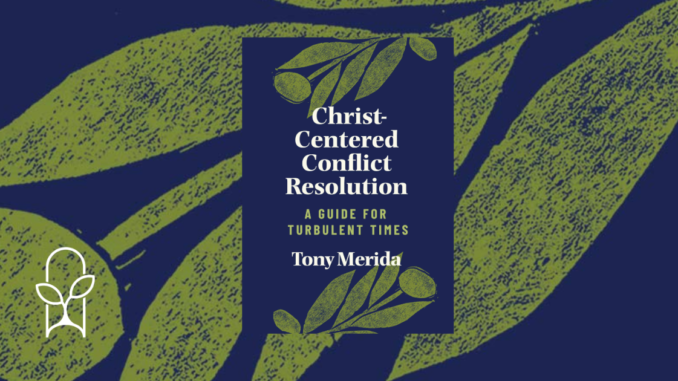
Also by this author: Ruth For You: Revealing God's Kindness and Care, Love Your Church: 8 Great Things about Being a Church Member, Gather, Belong, Welcome
Published by B&H Publishing on May 28, 2020
Genres: Non-Fiction, Christian Life, Theology
Goodreads

Have you ever noticed that conflict is absolutely everywhere? Though we all want harmony in our relationships and our world, peace seems so hard to come by. Maybe for you, conflict looks like the latest culture war that relentlessly screams at you to pick a side, and you’re tired of all the fighting. Or perhaps it takes another shape, like a hot-tempered spouse, rebellious child, passive-aggressive friend, difficult church member, withdrawn roommate, or angry social media comment. No matter its form, conflict always finds us. And often, we let it overtake us.
In this short, biblical, and practical book, pastor and author Tony Merida shows us that it doesn’t have to be this way. Merida not only paints a stunning picture of Christ our Peacemaker, he also shows us how to stop wishing for peace and go make it. In these pages, Tony will help you:
Discover where conflict comes from
Realize conflicts don’t have to define you, scare you, or undo you
Stop allowing your relationships to simmer in a place of division, anger, or strife
Understand the pattern and power of Christ as the ultimate Peacemaker
Tap into the Spirit’s supernatural ability to change you in the midst of your conflicts
Learn how to overcome evil with good
Anticipate conflicts and resolve them in biblical, Christ-centered waysStop waiting for peace to “hopefully” come to your doorstep. Instead, in the power and strength God provides, become a person who can make the peace you so deeply desire, and watch your relationships transform.
This book is a solid guide to basic Christian conflict resolution. Pastor Tony Merida writes with sensitivity to the challenges that many people have experienced over the past year, especially during the COVID-19 lockdown, and summarizes biblical teachings about conflict for people to apply in everyday life. At the beginning, he explains that even though more thorough resources exist, he wanted to write one that would be short, readable, and easy to apply, without high-level psychological concepts or step-oriented, prescriptive recommendations. He addresses how sin creates cravings and a desire for control, what it means to be a peacemaker, how Christ has made peace through the cross, and how we can grow in the fruits of the Spirit and replace “relational evils” with virtues. He also writes about how we can grow in love towards others, and shares practical tips for confronting others about conflict.
Audience and Focus
Christ-Centered Conflict Resolution: A Guide for Turbulent Times is a quick, easy read, and I appreciate how the author wrote with a broad audience in mind, not just for married people with kids. He includes illustrations related to single people dealing with roommates, and emphasizes the importance of relationships in every sphere of one’s life, not just within the nuclear family. However, this book is best for Christians who don’t know much about conflict resolution, or who haven’t learned about this before from a biblical perspective. It can be a helpful refresher for others, and we can always glean new insights from familiar truths, but someone who is expecting more intensive practical advice will be disappointed.
Merida provides some practical advice near the end, and also includes a short note about abuse, but the majority of the book is about developing right beliefs and transforming your own behavior in relationship to Christ. This is essential, but I would have been interested in more material to build on this foundation, and more practical ideas for how people can approach confrontations. Even when Merida does write about confrontation, he talks about how you may be responsible for 90% of the conflict, and should start by apologizing for your role. It is absolutely necessary for people to recognize and take responsibility for their sin, but what about the times when you’re only responsible for 10% of the issue? I would have appreciated more insight into how to deal with someone else creating problems, when you can’t and shouldn’t take the majority of the blame.
Conclusion
This book is a straightforward, accessible guide to understanding conflict from a Christian worldview, and can be very helpful to people who have never learned much about this. It can also be great for people who need a concise, encouraging reminder, or who want to work through this as a family to teach their kids about conflict resolution. However, it wasn’t all that I had hoped that it would be, because even though the basic principles are all true and well-presented, there aren’t a lot of ideas for practical application, or for more entrenched issues where you can’t attain reconciliation through your own apology. I would recommend this as a foundational resource, but Christians who already know the basics and are looking for more complex applications should pursue something else on the subject.
